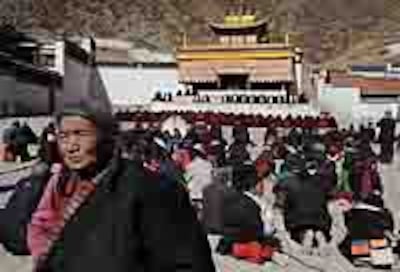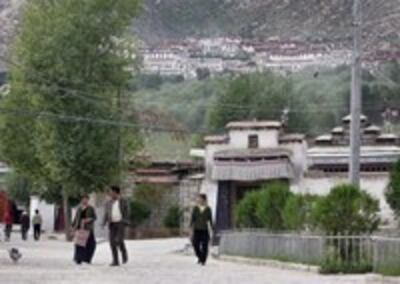
KATHMANDU—Two Tibetan Buddhist monks are in critical condition after stabbing their wrists and chests amid mounting anti-Chinese protests in the Tibetan capital, Lhasa, according to authoritative sources in the region.
Two monks from Drepung monastery on the outskirts of Lhasa attempted suicide Thursday and were in critical condition at the monastery clinic, the sources told RFA’s Tibetan service.
The two monks were identified as Kalsang and Damchoe, both originally from Kirti monastery in Sichuan province and now resident at Drepung monastery. Sources said the men had stabbed themselves in the chest, hands, and wrists. Both refused to be moved to hospital but were taken instead to the monastery clinic, the sources said.
"There are many other monks who hurt themselves in desperation, and protests are going on inside the monastery as of March 12 and 13," one source said. Another source described the two monks' condition as critical and said they were not expected to survive.
Also Thursday, the Chinese authorities squarely blamed the exiled Tibetan leader, the Dalai Lama, for instigating “successive trouble by some monks in Lhasa” and voiced determination to oppose them according to Chinese law.
The Chinese government is determined to safeguard the country's sovereignty and territorial integrity, and the vast majority of the Tibetan people are determined to safeguard national unity and solidarity.
Monks at another major Lhasa monastery have meanwhile launched a hunger strike aimed at pressuring the Chinese authorities, as protests against China's heavy-handed presence in the region spread to other Tibetan Buddhist convents and monasteries, according to sources who declined to be identified.
“The monks in Sera monastery are observing a hunger strike inside the premises of Sera," one source said. "They vowed not to eat and sleep unless their demands are met." The monks are demanding the withdrawal of paramilitary People's Armed Police (PAP) forces from the monastery compound and the release of monks detained during an earlier protest on March 10, the source said.
China blames Dalai Lama for spreading protests
Other sources, all of whom declined to be identified, reported additional protests at Reting monastery, north of Lhasa, and at Ganden monastery. Authorities in the Tibet Autonomous Region have also warned Tibetans employed as civil servants to stay away from monasteries and convents.
On Tuesday, armed Chinese police fired tear-gas to disperse a crowd of several hundred protesting monks near Lhasa. The protests began March 10 when hundreds of monks staged a rare demonstration on the 49th anniversary of a 1959 uprising crushed by the Chinese People’s Liberation Army. The Dalai Lama, now 72, subsequently fled into exile in northern India.

“There were probably a couple of thousand armed police, PSB personnel, wearing different uniforms. Police fired tear-gas into the crowd,” one witness told RFA’s Tibetan service. PSB denotes the China’s Public Security Bureau.
Lhasa neighborhood committees have mobilized to inspect every household in predominantly Tibetan areas of the city, searching for unregistered monks or nuns sheltering illicitly in private homes, sources told RFA’s Tibetan service.
Monks in two more monasteries in Qinghai province—Lutsang monastery in Mangra (in Chinese, Guinan) county, and Ditsa monastery in Bayan (in Chinese, Hualong) county—also staged protests Monday, sources said. Armed police surrounded Ditsa monastery during the protest but neither intervened nor detained anyone there, the sources said.
Tensions have been escalating in recent years in traditionally Tibetan areas of what is now western China, with Chinese authorities taking a tougher line against what they regard as ethnic “splittism,” or resistance to Chinese rule.
The Dalai Lama is regarded by China as a dangerous figure seeking independence for his homeland, although he says he wants only autonomy and for Chinese repression of Tibetans to end.
Chinese Foreign Ministry Spokesman Qin Gang meanwhile called the protests “a deliberate political plot of the Dalai Lama group to cause social unrest, separate Tibet from China, and wreck the stable, harmonious, and normal life of the Tibetan people,” according to China's official news agency, Xinhua.
“The Chinese government is determined to safeguard the country's sovereignty and territorial integrity, and the vast majority of the Tibetan people are determined to safeguard national unity and solidarity,” Xinhua quoted him as saying. "We are resolutely opposed to any plots attempting to separate Tibet from China. Relevant Chinese departments will handle the issue properly and strictly in accordance with law.”
In its dispatch, Xinhua said: "It is the common wish of all nationalities in Tibet to safeguard national unity, solidarity, and the harmonious society, Qin said, noting that the plots of the Dalai Lama group are doomed to failure.”
Original reporting in Uke, Amdo, and Kham for RFA's Tibetan service. Translated by Karma Dorjee. Tibetan service director: Jigme Ngapo. Written and produced in English by Sarah Jackson-Han.
